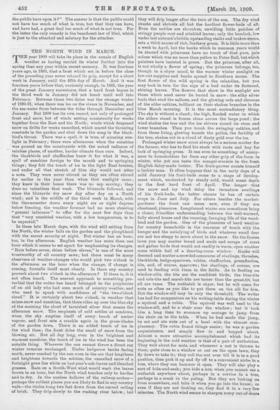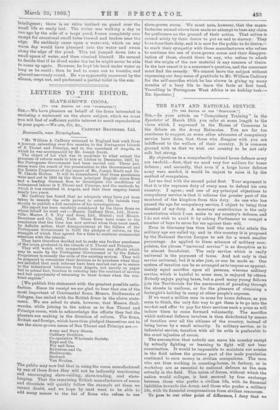THE NORTH WIND IN MARCH.
THE year 1909 will take its place in the annals of English weather as having carried its winter further into the spring than any year within recent memory. It was fourteen years ago, in 1895, that a frost which set in before the close of the preceding year never relaxed its grip, except for a short week in January, until the fifth day of March. And it was fourteen years before that, curiously enough, in 1881, the year of the great January snowstorm, that a hard frost begun in the third week in January did not break until well into February. Between those two dates was the strange winter of 1890-91, when there was ice on the rivers in November, and the sea-water froze between the tides through December and January. But 1909 has its own record, not only of prolonged frost and snow, but of winds setting consistently for weeks together from the East and the North; winds which deepened snow on drifts for weeks unmelted, which seared the thrusting rosebuds in the garden and shut down the song in the black- bird's throat. There was a spell, it is true, of amazing sun- light in February; there were afternoons when the sunshine was poured on the countryside with the naked radiance of rainless places, of another, harder climate than ours. Indeed, the blackbirds and chaffinches knew it for what it was, a spell of sunshine foreign to the month and to springing things ; they felt the touch of ice in the light East breezes, and under all that stretch of blue sky would not utter a note. They were never stirred as they are often stirred far earlier in the year than when that sunlight came ; they knew in their bones there was no sap moving; they drew no valentines that week. The blizzards followed, and since the blizzards dry snow day after day on a North wind; and in the middle of the third week in March, with the thermometer down every night six or eight degrees below freezing, the weather forecast had no more cheering "general inference" to offer for the next few days than that "very unsettled weather, with a low temperature, is to be expected."
In these late March days, with the wind still setting from the North, the winter falls on the garden and the ploughland with the surest eeverity at night. But winter has an hour, too, in the afternoon. English weather has more than one hour which it seems to set apart for emphasising its changes. "Rain before seven, shine before eleven," is one of the most trustworthy of all country saws; but there must be many observers of weather-changes who would pick two o'clock in the afternoon as the hour when the change, if change is coming, foretells itself most clearly. Is there any country proverb about two o'clock in the afternoon P If there is, it is not often heard. The nearest approach to something pro- verbial that the writer has beard belonged to the prophecies of an old lady who had seen much of country weather, and who used to speak with confidence of "the two-o'clock cloud." It is certainly about two o'clock, in weather that mixes snow and sunshine, that there rides up over the blue sky of the morning the cloud of tarnished silver that means the afternoon snow. The emphasis of cold settles at sundown, when the sky empties itself of every touch of umber vapour, and frost sets a crackle again in the grass-blades of the garden lawn. There is an added touch of ice in the wind then ; the frost dries the smell of snow from the blowing air. But all day long, even in the brightest and . warmest sunshine, the touch of ice in the wind has been the notable thing. Wherever the sun cannot throw a direct ray winter remains unchanged. Under hedgerow banks facing north, never reached by the sun even in the arc that lengthens and heightens towards the solstice, the unmelted snow of a fortnight gone lies white on last year's oak-leaves and bleached grasses. Rain on a South-West wind would wash the leaves brown in an hour, but the North wind touches only to harden and to dry. In the sunless hollows of the railway-arches- perhaps the coldest places you are likely to find in any country walk—the icicles bang two feet down from the curved ceiling of brick. They drip slowly to the rushing river below ; but
they will drip longer after the turn of the sun. The dry wind checks and shrivels all but the hardiest flower-buds of all. Even the nettles are shrunken, unwilling little patches of stringy purple root and crinkled leaves; only the hemlock, low under last autumn's brittle, upstanding stalks and broken stems, sets a thick saucer of rich, feathery green. It is little more than a week to April, but the banks which in common years would be starred with primroses have no touch of that pure, pale colour which was no more than yellow to Peter Bell, but which painters have insisted is green. But the primrose, after all, is not wholly a flower of spring ; the primrose belongs, too, though in a shyer mood, to the warmer winter sunlight on low-cut coppicea and banks spread to Southern noon& The first flower of the wild spring is the celandine, but you may look in vain for the sign of a bud under its flattened, shining leaves. The flowers that show in the sunlight are those which need never lie buried in snow: the silky silver buds that stud the sallow., and the glowing reds and chromes of the alder catkins, brilliant on their shaken branches in the blue March morning. It is the most contradictory thing. The sky is without a cloud; the high, flooded water in which the alders stand is frozen clean across the large pond; the wind shakes the tree and the ice shivers round its stem and lower branches. Then you touch the swinging catkins, and from those living, glowing tassels the pollen, the fertility of the tree, shakes out in a cloud of dusty gold over the ice.
Prolonged winter snow must always be a serious matter for the farmer, who has to feed his stook with roots and hay for lack of springing grass. It can even be something of annoy- ance to householders far from any other grip of the firm in winter, who yet can taste the mangel-wurzels in the fresh English dairy-made butter. The fruit-grower counts himself a luckier man. It often happens that in the early days of a mild January his fruit-buds come to a stage of develop- ment which, unchecked by steady cold, would mean death in the first hard frost of April. The longer that the snow and icy wind delay the immature swellings of his fruit-buds, the better chance he has of certain crops in Jane and July. For others besides the market- gardener the frost can mean new, even if they are chastened, pleasures. Lengthened winter can sometimes bring a closer, friendlier understanding between the well-warmed, fully stored house and the roaming, foraging life of the wood- land and the garden. One of the pleasures of hard weather for country households is the nearness of touch with the hunger and the satisfying of birds and whatever small deer are not too sleepy to move about in the snow. On the frozen lawn you may scatter bread and seeds and scraps of meat and gather birds that would not readily in warm, open weather come within hail of a drawing-rooin window. Rooks will descend and scatter a crowded concourse of starlings, thrushes, blackbirds, hedge-sparrows, robins, chaffinches, greenfinches, tits, and, of course, sparrows ; the etarliegs, of course, are used to feeding with them in the fields. As to feeding on window-sills, the tits are the confident birds; the blue-tits and cole-tits and marsh-tits are tamer than the great-tit, but all are tame. The nuthatch is shyer, but he will come for nuts as often as you like to put them on the sill for him. But the window-sill may be only the threshold. The writer has had for companions on his writing-table during the winter a squirrel and a robin. The squirrel was well used to the window-sill, and to a chair near the window ; but it took him a long time to summon up courage to jump from the chair on to the table. When be bad made the jump, he sat and ate nuts out of a bowl with the utmost com- placency. The robin found things easier; be was a garden acquaintance, and simply flew in and hopped about. Almost a more attractive accomplishment which bad its beginning in the cold weather is that of a pair of nuthatches. They wait about for nuts, and whenever a nut is thrown to them, quite close to a window or out on the open lawn, they fly down to take it; they roll the nut over till it is in a good position, then pick it up and fly off to a convenient niche in a tree, where they can hammer it open. They will also play a sort of hide-and-seek; you hide a nut, when you cannot see a nuthatch anywhere about, perhaps in a crevice in a tree, perhaps in a crack in the paling. But they are looking on from somewhere, and take it when you go into the house ; or even if they are not looking on, they find it in a very few minutes. The North wind seems to sharpen every out-of-doors intelligence; there is an extra instinct on guard over the small life so easily lost. The writer was walking a day or two ago by the side of a large pond, frozen completely over except for occasional small holes thawed and broken near the edge, He suddenly came upon a water-rat, which on any warm day would have plumped into the water and swum along the edge of the pond. This rat jumped down into a small space of water, and then checked himself. He seemed to decide that if he dived under the ice be might never be able to come up again. However, he kept his bead under water as long as he could ; then he had to come out to breathe, and glanced nervously round. He was apparently reassured by the silence, crept out, and performed a partial toilet in the sun.











































 Previous page
Previous page